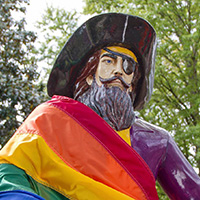
In the fall of 2016, pioneering research by an ECU history major, Zachary P. Dale, helped shape a narrative on a campus group previously spoken of behind closed doors if at all, the gay community. Some of the key sources Dale uncovered had for decades remained hidden in full view in publications such as the student newspaper, The Fountainhead (formerly, the East Carolinian), and the yearbook, the Buccaneer. Interviews that Dale conducted with relevant parties also contributed important data. Currently evolving as a digital archive, Dale’s scholarship documents a dimension of campus diversity that always existed, yet due to bigotry, intolerance, and homophobia, was rarely considered an overt, integral part of ECU campus life. In 2017, Dale’s paper, “Queer History: LGBT Activism at East Carolina University,” won second prize in the Rhem-Schwarzmann student research competition. Since that time, the LGBT narrative has crystalized as an important component of ECU history.
Among Dale’s discoveries were anonymous letters written to the Fountainhead in late fall 1978 lamenting the absence of a gay community on campus. One letter explained, however, that gays were “not alone” at ECU because there was a gay community in Greenville centered around the Eastern Gay Alliance (EGA) and a bar, the Paddock Club, on Dickinson Avenue. Organized in 1975, the EGA worked for gay rights in the east by sponsoring, among other things, speaking engagements through its speaker’s bureau. A mailing address – a PO box – was provided for those interested in reaching out.
The letters made a difference: in the spring of 1979, the Fountainhead ran an article announcing that a new group, the East Carolina Gay Community (ECGC), had submitted its constitution to the SGA Rules and Judiciary Committee. With studied neutrality, the chair of the committee, Jeff Triplett, related that the document had been duly submitted, met all SGA guidelines, and “passed favorably.” Triplett added that it was “one of the better written constitutions we’ve received all year.” Later accounts, however, recalled that there had been, in the committee’s deliberations, “heated debate as to whether the group should even be recognized.”
The 1979 Buccaneer, another source uncovered by Dale, provides the fullest account of the history of the gay community at ECU up until that time. After crediting the Fountainhead letters with opening dialogue on the plight of the gay community, the Buccaneer relates that when faculty in psychology and sociology were asked, they declined to serve as sponsors. An English faculty, Edith Webber, eventually agreed to be faculty sponsor for the group. Despite such apparent “homophobia,” the ECGC persevered, sponsoring counseling services, campus speakers, and participation in the Southeastern Conference of Lesbians and Gay Men at Chapel Hill. The campus ministry and the Sisters of the Immaculate Heart offered crucial assistance to the budding group, as did Sister “Happy” Shondell and Sister Jane of the Newman Catholic Center who provided a meeting place. Although consisting of a dozen students when organized in December 1978, the ECGC soon quadrupled. Throughout its existence, it purpose was to promote self-awareness and positive self-image among gays as well as to encourage understanding among all people of different sexual orientations.
In April 1979, the ECGC won “the Burger King ‘best darn organization on campus’ contest.” While recognizing the challenges faced by the ECGC, the Buccaneer’s two-page spread on the new organization cast it in positive terms as having contributed to “harmony among people of all beliefs and sexual orientations.” After 1984, however, the ECGC vanished from campus life. Nevertheless its appearance in 1978-1979 indicated the beginnings of a student-led transformation in campus culture toward greater tolerance, inclusion, and diversity for all. Through his work documenting and interpreting these developments and ones that followed, Zachary Dale has added significantly to campus understandings of that transformation.
Sources
- Cagle, Chris. “SGA approves Gay Community constitution at recent meeting.” Fountainhead. February 13, 1979.
- Dale, Zachary P. “Queer History: LGBT Activism at East Carolina University.” Unpublished manuscript. 2017.
- “East Carolina Gay Community Strives To Promote Understanding.” .Buccaneer.. Greenville, N.C.: East Carolina University, 1979. Pp. 200-201. https://digital.lib.ecu.edu/15358.
- Name withheld by request. “Gay Organization is needed.” .Fountainhead.. November 28, 1978.
- “Rhem-Schwarzmann Prize Winners.” Joyner Library. East Carolina University. Greenville, N.C. https://library.ecu.edu/awards/rhem-schwarzmann/winners/.
Citation Information
Title: East Carolina's LGBT Community, 1979
Author: John A. Tucker, PhD
Date of Publication: 7/18/2019